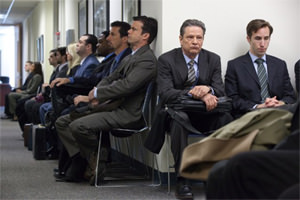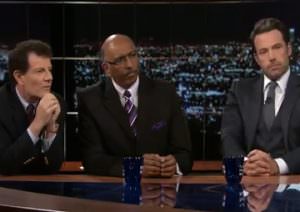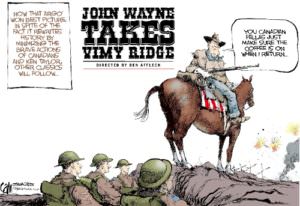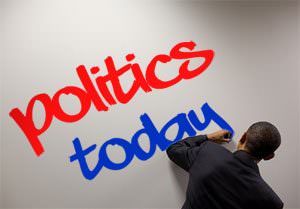Three ‘Company Men’ and a Pink Slip
What we get here, putting it as charitably as possible, are symbolic figures, the semi-fictional, least common denominators of newsmagazine cover stories that are supposed to put a human face on grim statistics."The Company Men" isn't “Dilbert,” but it’s not Dostoevsky either.
The company is GTX, a New England shipbuilder with aspirations to conglomerate status. The men are three executives in the throes of a downsizing campaign designed to make the concern more attractive in the world of mergers and acquisitions. A little bit of belt-tightening—actually, quite a bit of it—will show the business world that GTX has the discipline, the unsentimental toughness, to play with the big guys. And never mind the human consequences.
In pecking order, the men are Gene McClary (Tommy Lee Jones), the company’s co-founder and No. 2 Man; Bobby Walker (Ben Affleck), a salesman, who’s doing well and spending big; and Phil Woodward (Chris Cooper), who has risen from the manufacturing floor and seems never to have quite gotten over the insecurity of his modest corporate origins. Writer-director John Welles’ “The Company Men” traces their responses to their firings—in a not very compelling fashion, I’m sorry to say.
By this I mean that in an America where unemployment seems to be permanently fixed at about 10 percent, where the shock of redundancy daily strikes down men and women who had every reason to believe they had something like lifelong job security, we have a need for fictions that take up the human consequences of corporate survivalism. Instead, what we get here, putting it as charitably as possible, are symbolic figures, the semi-fictional, least common denominators of newsmagazine cover stories that are supposed to put a human face on grim statistics. A less agreeable way of saying that is that they are clichés.
On the whole, and after considerable unhappiness, things work out all right for a two-thirds majority of our anti-heroes. McClary, for example, though clearly rich enough to retire, forms a company that seeks a return to building ships—and core values, too. This costs him his mistress, for no compelling reason that I can see, which is no small matter, since she is played by the always delicious Maria Bello. But, you know, that’s the way things tend to work out in “serious” television, which is where Welles (“ER,” “The West Wing”) became rich and sort of famous.
McClary brings into this new enterprise Affleck’s Bobby, whose adventures in humility stand at the center of the film. He does not take downsizing gracefully. His interviews for new jobs are uniformly disastrous (he’s an arrogant, angry and self-pitying wise guy). The man needs chastening, which is supplied by his brother-in-law (Kevin Costner), a house builder, who gives him a job pounding nails. This honest toil, building solid, lasting products, is of course salutary. It reminds him, and us, of the Values That Made America Great.
The only character who does not get this film’s message is Cooper’s Woodward, who sinks into despair and a sad, possibly morally instructive, ending. The poor guy just doesn’t have the get-up-and-go that is required to roll with the punches and re-create himself as a new and improved version of his former self. The movie, of course, needs such a figure. It has to show that people do not universally escape unscathed from vast social crises. But the character is obligatory and sketchily developed; he’s an earnest of the movie’s aspirations to be something more than a low-key problem melodrama, to at least reach for a tragic note. But his sad fate is almost thrown away as the movie heads for a more hopeful ending.
In some sense, “The Company Men” is too nice for its own good. Losing a job—particularly one that you have held for a long time—is for almost anyone a trauma that has the potential to rank with divorce or a sudden death in the family as a life-changing event. This film flirts with an acknowledgment of that hard fact, but it does not really dig into it very deeply. We are always under the impression that whatever bad things are happening to its people are more dramatic conventions than serious—dare one say it?—existential threats to their well-being. There is just no true darkness, no rage, in the thing. It’s not “Dilbert,” but it’s not Dostoevsky either. It is, at best, well-meaning.
Your support matters…Independent journalism is under threat and overshadowed by heavily funded mainstream media.
You can help level the playing field. Become a member.
Your tax-deductible contribution keeps us digging beneath the headlines to give you thought-provoking, investigative reporting and analysis that unearths what's really happening- without compromise.
Give today to support our courageous, independent journalists.





You need to be a supporter to comment.
There are currently no responses to this article.
Be the first to respond.